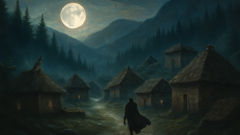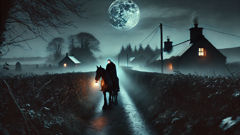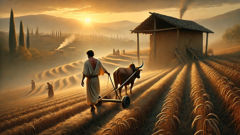Introduction
In the shadowed heart of the Accursed Mountains, where ancient pines stand as silent sentinels and the mist curls through the valleys like restless spirits, a small Albanian village huddled for warmth and comfort. The mountain wind rattled through thatched rooftops, carrying with it more than the chill of early spring. It whispered old warnings—some half-remembered, some feared to be true—of the shtriga, the night witch who fed upon the blood of infants. In this isolated hamlet, suspicion and dread grew with the lengthening nights. Babies fell ill without explanation, their faces pale as moonlit milk, their cries frail and fleeting. Mothers clutched their children closer; fathers slept with axes at their bedsides. Some villagers clung to prayers and charms stitched with wolfsbane, while others, eyes wide with sleeplessness, searched for the face among them that was not what it seemed. It was said the shtriga moved unseen, that she could be anyone—a neighbor, a visitor, even kin. Only by the smallest of signs—a shadow lingering too long, a strange bird at the window, an unexplained bruise—did her victims know she had come. The villagers, bound together by centuries of custom and the ever-present specter of loss, braced themselves against a terror older than memory. And yet, in the darkest hours before dawn, when the mountains were cloaked in silence and fear, courage found unlikely roots. It grew in the heart of a grieving mother. It glimmered in the resolve of a skeptical healer. It lingered in the uncertain steps of a child too curious to be cowed. As tragedy struck anew and trust frayed at the edges, the people of this mountain village would be forced to face not only the shtriga’s shadow but the darkness within their own hearts. In a land where the line between superstition and reality was as thin as mist, their struggle would become legend—one that echoed long after the witch’s cry faded from the mountain air.
The Whispering Night
The village of Guri i Zi had stood for centuries against the elements and invaders, its people weathered and proud, their eyes the color of storm clouds. Set on a rocky ledge above a tumbling river, the settlement was small—just thirty families—and bound by necessity to one another. The land was hard, but so were they. Their language was ancient, and their legends older still. It was in early April, with the earth still shivering beneath patches of snow, that the first child fell ill. She was the daughter of Mirela, a weaver known for her nimble fingers and for humming lullabies that soothed the restless air. Little Drita’s cheeks, once rosy, lost their glow. She whimpered in her sleep and woke with lips blue as mountain gentian. The healer, Drane, came at dawn, bearing her pouch of dried herbs and amulets. She pressed her wrinkled hand to Drita’s forehead and frowned. 'There’s no fever,' she murmured. 'Yet she grows weaker.' Mirela’s heart twisted. She’d heard her mother’s stories of the shtriga, but in the sober daylight, such fears seemed childish. That night, Drita worsened. Her breathing grew shallow. Mirela, sleepless, paced the floor, clutching a worn charm carved from horn. Outside, the wind howled. Sometime after midnight, a barn owl shrieked. Mirela rushed to the window and glimpsed something—a hunched figure, pale and thin, flitting at the edge of the forest. The next morning, word spread that two more infants had taken ill. Panic seeped through the village like damp through stone. At the council house, men gathered, faces drawn. 'It’s the shtriga,' old Kreshnik declared, his voice grave. 'I saw a crow at my window at midnight.' Others nodded, muttering about strange dreams and livestock gone missing. Drane, always skeptical of superstition, tried to calm them. 'Illness spreads fast in spring,' she reasoned. 'We must tend to the sick, not chase shadows.' But her words carried little weight against centuries of fear. That night, Mirela could not rest. She lay beside Drita, clutching her limp hand, every creak of the house setting her nerves on edge. She recited prayers and pressed salt at the doorways. At some point, she drifted into a fitful sleep. She awoke to a chill—the window ajar, frost on the sill, and Drita’s tiny chest barely moving. Mirela’s scream broke the dawn silence. The healer arrived, eyes dark with worry. She examined the girl. 'Look,' she whispered, pointing to two small red marks at the base of Drita’s neck. The council was summoned. 'We must find the witch,' Kreshnik insisted. Suspicion fell on outsiders first—a traveling merchant, a widow who kept to herself, even Drane for her knowledge of herbs. No one was above doubt. As the days wore on, the sickness spread. Three more children were stricken, all under the age of five. Fear thickened like smoke. Neighbors eyed each other warily. Doors were barred after sundown. But Mirela, driven by love and desperation, refused to accept her daughter’s fate. She sought Drane’s counsel. Together, they pored over old remedies and whispered spells. Drane, though doubtful, could not ignore the mounting evidence—the unnatural chill, the marks, the sense of presence lurking in every shadow. One night, as Mirela sat by Drita’s bedside, a soft tapping came at the window. She held her breath. The latch lifted, though no hand touched it. A cold gust swept in, carrying the scent of earth and rot. A figure materialized in the gloom—a woman, pale as bone, eyes black as night, her mouth twisted in a hungry smile. The shtriga.
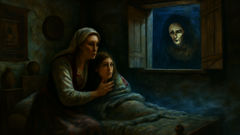
Unmasking Shadows
Mirela stared in horror as the shtriga hovered at the window, her long fingers curling around the frame. The witch’s black eyes seemed bottomless, sucking in the candlelight. She whispered Mirela’s name—an unearthly sound, half wind, half malice. Mirela could not move, could barely breathe. But as the shtriga’s gaze shifted to Drita, instinct overwhelmed fear. Mirela snatched a wooden rosary from the bedpost and flung it toward the window. The shtriga hissed, recoiling into the night as if burned. The window slammed shut with a force that rattled the panes. Trembling, Mirela gathered Drita into her arms. She knew now that this was no fever nor ordinary curse—evil had come to Guri i Zi. Dawn brought no comfort. Word spread fast: the shtriga had shown herself. Men armed themselves with sickles and torches, forming watch patrols at every crossroads. Drane arrived, eyes searching Mirela’s face for truth. Mirela described what she had seen—the pallor, the eyes, the smile that lingered in memory like the aftertaste of bitter herbs. Drane’s skepticism wavered. She examined Drita’s wounds; the marks were fresh and deepening, rimmed with bruised skin. 'Old tales say the shtriga drinks blood and leaves her victims wan until death,' Drane said quietly. 'Some say she takes the form of an owl or a crow by day.' They recalled an ancient remedy: to heal the shtriga’s victim, one must track the witch, collect a few drops of her blood, and feed it—mixed with honey—to the afflicted child before sunrise. It sounded like madness. But desperation breeds courage. That night, Mirela and Drane prepared. They laced the window with garlic and sprinkled salt at every threshold. Drane carried a silver dagger she’d inherited from her grandmother. Mirela hid a vial of honey beneath her apron. The night stretched thin and cold. The village was silent save for the crackle of fire and distant howling. Sometime after midnight, Mirela heard movement outside—a soft shuffling in the frost. She peered through a crack in the door and saw the shtriga gliding between houses, her feet barely touching the ground. Mirela steeled herself and slipped into the night, Drane at her side. They trailed the witch through the woods, breath misting in the moonlight. The shtriga paused by a fallen tree, her back to them, humming a lullaby Mirela recognized—a twisted echo of her own voice. Drane gripped the dagger and whispered a prayer. They crept closer. The shtriga turned. For an instant, her face flickered—was she someone Mirela knew? The features shifted like shadows. With a cry, Drane lunged and slashed the witch’s arm. Black blood welled up, gleaming in the moonlight. The shtriga shrieked, melting into mist, but not before a few drops spattered onto a stone. Mirela rushed forward, scooping them up with trembling hands. They hurried back to Drita, mixing the shtriga’s blood with honey and forcing it between her lips. The child shuddered, then settled into a deep, peaceful sleep. By sunrise, color had returned to her cheeks. The curse, it seemed, was broken. But questions lingered. Who was the shtriga? Why had she chosen their village? That evening, as Mirela walked to the well, she noticed a trail of dark blood leading toward the old chapel on the hill—a place long abandoned.
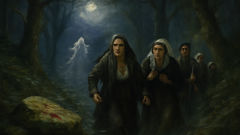
Revelations and Reckoning
The old chapel loomed atop a craggy hill, its walls crumbling and roof sagging under the weight of years and neglect. Ivy crept through shattered windows. It was a place children dared each other to approach in daylight, and no one entered after sunset—save perhaps for those who no longer feared the living or the dead. Mirela hesitated at the threshold, Drane at her side. The air was thick with decay and incense. In the pews, moonlight cast tangled shadows that danced with every gust of wind. A faint sobbing echoed from behind the altar. With slow steps, Mirela circled the altar and found a woman crouched on the stone floor, cradling her bleeding arm. At first, she did not recognize her—so gaunt and ghostly she had become. But as Mirela’s eyes adjusted, she gasped. 'Elira?' Elira was a cousin by marriage, widowed young and shunned by many for her odd habits—speaking to birds, walking alone at dusk, collecting wild herbs that others feared. She had lived on the village edge for years, always polite but distant. Elira looked up, eyes rimmed with red, tears carving clean lines down her dirt-streaked face. 'I never wanted this,' she whispered. 'It began when my child died last winter.' Grief twisted her features. 'I begged the spirits for a chance to see him again. I made an offering at this altar. That night... something answered.' Drane’s face hardened. 'You let darkness in.' Elira nodded, broken. 'I tried to resist. But the hunger—' She sobbed. 'Each night it grew stronger. I couldn’t bear the loneliness.' Mirela’s fear mingled with pity. She remembered Elira’s kindness once, before grief hollowed her out. Drane produced the silver dagger and handed it to Mirela. 'The curse must end.' Elira did not flinch. 'Do it,' she said. 'Or teach me to fight it.' Mirela hesitated. Was there redemption for the shtriga? Or did mercy only invite further doom? Elira wept, her agony clear. Mirela pressed the blade to Elira’s palm, not to harm but to draw more blood—enough for all afflicted children. Drane performed an old ritual, speaking words of cleansing and forgiveness. The wounds burned with silver’s touch. Elira convulsed, then collapsed, breathing shallow but alive. 'I feel it fading,' she murmured. They brought Elira back to the village under cover of night. Some wanted her cast out or worse; others saw only a broken woman consumed by grief and ancient evil. The council debated until dawn, torn between justice and mercy. In the end, Elira was exiled—banished to a hermit’s hut deep in the forest, forbidden ever to return but allowed to live. Over the following days, every stricken child recovered. The dark marks faded from their skin. The air in the village lightened. Night birds sang again, and no more shadows flitted at windows.
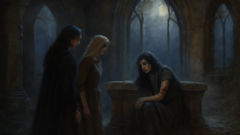
Conclusion
In the weeks that followed, Guri i Zi tried to return to normal, but scars lingered—in flesh and in memory. The villagers had seen evil walk among them, wearing the face of one of their own. Old boundaries between superstition and reason blurred; even Drane, once skeptical, now kept charms by her door. Mirela tended to Drita with newfound tenderness, her gratitude heavy with sorrow for Elira. The story of the shtriga became both a warning and a reminder: that grief can open doors best left shut, and that true courage lies not only in confronting monsters but in showing mercy when possible. Some nights, children claimed to see a pale figure at the forest’s edge, watching with mournful eyes before fading into the mist. Whether ghost or memory, no one dared investigate. The legend of the shtriga endured—whispered from mother to child as twilight deepened and the wind rattled old bones in the eaves. In this place where mountains met sky, and where fear and hope lived side by side, the people learned that the darkest evils are sometimes born not from malice, but from wounds too deep for daylight to heal.

